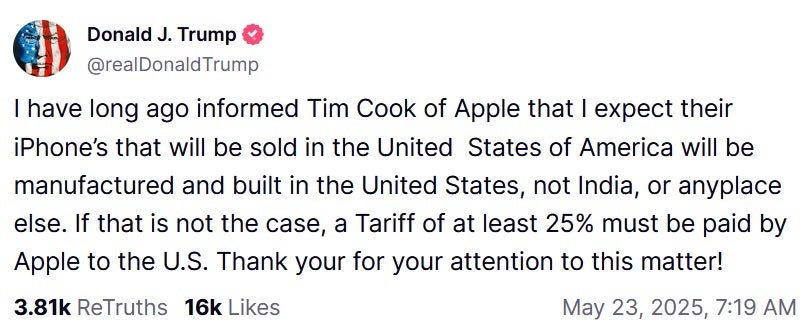Apple's plan to build iPhones in India ticks off Trump who posts a threat on social media
President Trump threatens to impose a 25% or higher tariff on iPhone units not built in the U.S.

President Donald Trump really wants to see a "Made in USA" label on the iPhone. Trump this morning wrote a post on his Truth Social platform that threatened Apple and American iPhone buyers with a 25% or higher tariff. The import tax would be imposed on all iPhone units shipped to the U.S. that were not manufactured in the States. The president is obviously aware of what Apple has been doing in order to skirt around the tariffs imposed on Chinese exports to the U.S. which include the iPhone and other Apple devices assembled in China.
Earlier this month during Apple's quarterly earnings call, CEO Tim Cook told Wall Street analysts and the media that "the majority of iPhones sold in the US will have India as their country of origin." Currently, tariffs on electronic items including smartphones have been suspended. A 10% tariff is still being charged on most products being imported into the U.S. Tariffs on China, which were as high as 145% this month, have been reduced to 30%.
Replicating the current iPhone supply chain in America would be a very difficult task
In his post, Trump specifically mentions that a "tariff of at least 25%" be charged on iPhone units sent to the United States except for specific phones that are "built in the United States, not India, or anyplace else." The president, who has had a friendly relationship with Tim Cook, has indeed spoken to him in the past about moving iPhone manufacturing to the U.S. But what Trump might not understand is that Americans are not going to be eager to take low-paying jobs on an assembly line. That doesn't even take into consideration whether building a supply chain for U.S. iPhone production is feasible.

President Trump threatens imposing a 25% or higher tariff on iPhone units not made in America. | Image credit-Truth Social
Trump, who is usually astute at marketing himself, could be making a big public relations mistake here. No matter how you slice it, forcing Apple to build its most important product in the U.S. is going to lead to higher prices. If Apple does cave to Trump, the additional costs of maintaining production facilities in the U.S. and obtaining supplies will rise forcing iPhone prices to rise. If Apple decides to keep production out of the U.S., the 25% higher tariff imposed will also lead to sticker shock for iPhone buyers.
Either way, the president is setting himself up to be the person that Americans will blame for higher iPhone prices. The device remains popular in the States where it is the top selling smartphone.
Dan Ives, global head of technology research at financial services firm Wedbush Securities, says that building the iPhone in America could result in prices soaring to $3,500 for a single handset. "You build that (supply chain) in the US with a fab in West Virginia and New Jersey, they’ll be $3,500 iPhones," Ives said last month on CNN.
Moving iPhone production to the States has been an itch that Trump keeps scratching. In Qatar last week during his trip to the Middle East, the president said, "I had a little problem with Tim Cook. I said to him, ‘Tim, you’re my friend. I treated you very good. You’re coming in with $500 billion.’ But now I hear you’re building all over India. I don’t want you building in India."
Trump wants to return "precision manufacturing" to the States says his Treasury Secretary
Treasury Secretary Scott Bessent said on Fox News this morning that the president would like to "bring back precision manufacturing to the U.S."
No matter what Apple decides to do, there will be no winners in this battle. There is nothing inherently wrong for an American president to ask an American company to move production of a particular product to America. Hell, Trump isn't the first POTUS to request this of Apple. But like President Obama before him, Trump needs to understand the likely ramifications of his demand.
When the late Steve Jobs met with former President Obama in October 2010, he pointed out that Apple, which needed to hire 30,000 industrial engineers at the time, could not find that many in America to hire. Blaming the education system in the U.S., Jobs told Obama "If you could educate these engineers, we could move more manufacturing plants here."
Follow us on Google News













Things that are NOT allowed:
To help keep our community safe and free from spam, we apply temporary limits to newly created accounts: